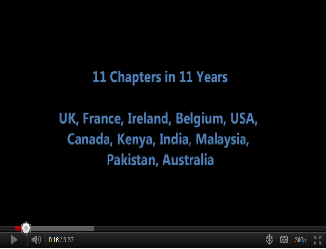4th Annual Global Sikh Civil and Human Rights Conference 2012
Highlights- Face-Off with Challenges Impacting the Global Sikh Community
- For pictures of the 4th Global Sikh Civil Rights Conference please click here
- To view highlights of The 4th Global Sikh Civil Rights Conference please click here
New York, USA: The UNITED SIKHS' Fourth Annual Global Sikh Civil and Human Rights Conference held at the United Nations Church Center, this Tuesday on the 24th of April. The delegates from around the globe raised and discussed pressing issues facing the Sikh community. The ban on the turban in French schools, on ID photographs and its domino effect in other European and western countries were the main highlights of the conference. France's refusal to implement the United Nation Human Rights Committee's (UNHRC's) decision in favour of 76 year old Ranjit Singh was rebuked by participants as a direct violation of the UN's preamble - reaffirm faith in fundamental human rights in the dignity and worth of the human person, in the equal rights of men and women and of nations large and small. This conference provided, to the the representatives of the 25 million Sikhs across the globe, a unique platform to discuss their concerned future and the way forward. The 4th annual UNITED SIKHS Global Sikh Civil and Human Rights report released on this day is the only report of its kind that raises and discusses issues impacting the Sikhs across the globe.
The main focus of the discussions was around Identity and its role in Religion, Human Rights and the United Nations. The discussions were centered around the protection of the Sikh Civil and Human Rights and the Role of Identity in Religion. Speakers and participants had lively debates and discussions resulting in a superfluity of suggestions for guiding advocates and leaders on the way forward.
Drawing from Sikh history and its unparallel richness and the significance of the 5 Kakaar (articles of faith), Sikh leaders from all over the globe highlighted concerns around ethnicity and the challenges they face around the world.
In light of the recent disappointing reply by France, refusing to implement the decision of the UNHRC in Ranjit Singh's turban case, a historic resolution was passed at the conference and is as follows:
Sardar Avtar Singh Ji - Shiromani Gurdwara Parbandhak Committe (SGPC) President; Sardar Daljeet Singh Ji - Chairman, Dharam Parchar Committee of the Delhi Sikh Gurdwara Management Committee (DSGMC) ; the American Gurdwara Prabhandak Committee, the World Sikh Council and the religious leaders of all faiths, Presidents of Gurdwaras, institutional heads, advocates and community members conversed on the issue of Ranjit Singh's Turban case and promised to ensure that:
- We will leave no stone unturned in terms of advocacy with our elected representatives to push France to change its stance
- We will provide the much needed support to our French brothers and sisters who wish to practice their faith freely
- We, as are other communities deeply perturbed and concerned about the domino effect in other countries from the wrong precedent being set by France, and will continue voicing our concerns to the United Nations and other Human Rights bodies across the globe.
- We will advocate to ensure that the UN issues a statement calling on France to uphold religious freedom by honoring its obligations under the ICCPR
- The SGPC to ensure that the Chief minister of Panjab passes a resolution, in the coming session of the State Legislative Assembly, asking the Central Government to stop all trade with France, until it lifts the ban on the wearing of the Turban in schools and on photo-ids.
S. Avtar Singh, SGPC President, emphasized his support for the turban cases and complimented UNITED SIKHS for its work in this field and promised all possible support from the SGPC. He also told the audience that, the SGPC in India takes the France issue very seriously; that he has had many meetings with Prime Minister Manmohan Singh in this regard which, however, have not produced any change in the attitude of the French government to change their law. He said, he will vociferously raise his concerns impacting the global Sikh community with the Government of India.
S., Avtar Singh, SGPC President
DSGMC's Chairman of Dharam Prachar Committee, Daljeet Singh, said, "We are supportive of the action taken by UNITED SIKHS and will continue to provide our unflinching assistance. We will soon come up with literature that distinguishes the Sikh articles of faith which will be translated into various languages, and will be sent to major airports around the world."
Dabinderjit Singh (Sikh Federation),Dr Pritpal Singh (AGPC), Daljeet Singh (DSGMC) Avtar Singh (SGPC), Astt Pr Rahuldeep Singh (California Lutheran Uni)
Commenting on the conference and the issue, New York State Senator, Kevin Parker stated " I am a part of this struggle and want to be a partner, and help Sikhs develop".
US Congressman, Mike Honda, in his written message, congratulated UNITED SIKHS and said, "Today's Global Conference brings together leaders of various sectors of society and provides an arena for discussion of ideas and concerns that affect Sikhs. As Chair Emeritus and Immigration Taskforce Chair of the Congressional Asian Pacific American Caucus, I have been honored to partner with UNITED SIKHS in fighting for the human and civil rights of all Sikhs worldwide. Whether it's combating hate crimes and xenophobia, or promoting the reporting of bias-related incidents through data collection, I am proud to be an advocate of the Sikh community in the United States Congress."
ACLU President Susan Herman talked about how the ACLU successfully litigated cases on behalf of Sikhs, and stressed on the need for the american legal system to adopt international law and treaties on human and civil rights particularly in instances where domestic legislation is inadequate to provide just results.
Pushpinder Singh QC, an international human rights lawyer, participated in the conference via call from London and condemned how France seeks to compare wearing a turban to wearing spectacles with frames that are thick or which mask the eyes. He said that it belittles the humiliation felt by a person who is required to remove a Turban by stating that it is an extremely momentary and minimal restriction limited to the click of a camera. The French comments show a disturbing and profound lack of respect and understanding of the Sikh faith. He also talked about the legal aspects of the case, and what further measures could be undertaken.
Attorney Mia Gonzalez and Attorney James Miller, of O'Melveny & Myers, the lead counsel in Ranjit Singh's case commented that the reply by France to the committee is disappointing; that France has reiterated the same arguments, and that with UNITED SIKHS' legal team they would file a further submission to the committee to pursue France to reconsider its decision.
Members from UN sub-committees, human rights lawyers and academicians shared their experiences and extended their support through suggestions and ideas as to how freedom of religion can be ensured for minorities around the world.
A French Sikh youth, who had flown in from France to share his heart rendering story of what community members and he personally underwent after the law banning the turban was passed was visibly saddened. He said he felt as if he was 'stripped not only of my religious right, but felt as if my dignity was snatched away from me'. "Every public school that I applied to refused to admit me. I had to use a bareheaded photograph for my identity cards, under compulsion, which was beyond humiliating. Every time I view it, I see someone who has been dehumanized. I pray for a change to occur and pray it occurs quickly so my crown does not continue to get desecrated."
S.Sukvinder Singh, Head of Policy for Work Place Inclusion, Equality and Human Rights Commission and executive member of the Sikh Council UK, emphasized the need for the community to extensively get involved in lobbying efforts when legislation affecting the community is proposed. He cited an example of the Offensive Weapons Act in the UK. When that bill was proposed, the Sikh community, being proactive and through extensive lobbying, was able to get an exemption to carry such perceived objects for religious purposes, namely the kirpan.
UNITED SIKHS USA President, Kuldip Singh, said, "We are committed to our mission with even greater motivation than before and will be a watchdog to fight against discrimination at all levels and will expand to build a legal framework with new capacity to take up challenges impacting the global community. We are working hard and eagerly look forward to the day when Sikhs in France will wear the turban without fear."
The Global Sikh Civil Rights Conference serves as a platform to unite the global Sikh communities and serves as a conduit for an annual gathering of Sikh leaders, advocates, human rights activists and delegates from all over the world to deliberate and implement strategies to empower and tackle issues which effect Sikhs in all parts of the world. The conference has evolved to become the fertile ground from which ideas are forged into substantive action which engage and allow Sikhs to become vibrant and respected members of the countries in which they reside.
Engage with UNITED SIKHS and make an impact, a difference, and a change within your community.
Contribute to UNITED SIKHS through the local chapter in your country www.unitedsikhs.org
Issued by:
Mejindarpal Kaur
Legal Director
International Civil and Human Rights Advocacy (ICHRA)
E: law@unitedsikhs.org
P: 888-243-1690 | 646-688-3525


